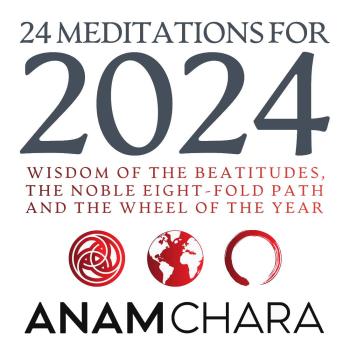
A reader of this blog sent me the following question today.
Hi Carl,
I see from conservative Christian circles that WCCM and Centering prayer is labelled new age and dangerous.
Are these practices Christian really? Or are we trying to incorporate eastern meditation into Christianity ?
First, the short answer. Contemplative practices like Centering Prayer and Christian meditation are rooted in the Christian tradition, roots that go back to the Desert Mothers and Fathers and the medieval mystics. These are Christian practices. As for “incorporating eastern meditation into Christianity,” I don’t believe there’s anything wrong with doing that, and it’s true that both Centering Prayer and Christian meditation have been influenced by eastern spiritual practices like transcendental meditation or mantra meditation. But the core practices themselves are Christian, with a long history in the church.
I’ve written about this before. In 2006, I wrote a blog post called Answers to Contemplation’s Objectors. So this unfortunate phenomenon of Christians attacking their own community members because we engage in contemplative practice is nothing new.
In fact, this is a centuries old problem. Consider what Teresa of Ávila, one of the great mystics of the Christian tradition and a Catholic saint and doctor of the church, had to contend with in her day. This quote comes from the introduction to The Way of Perfection in the Collected Works of St. Teresa of Ávila, Volume 2:
Conservative theologians feared that in the practice of mental prayer lay the seeds of Protestantism, which was as dreaded as the plague by both the civil and the ecclesiastical rulers of Spain in the golden age. The Dominican friar Melchior Cano, a theologian at the Council of Trent and consultant to Philip II and to the Inquisition, attacked his fellow Dominican, Archbishop Carranza, and Luis de Granada for promoting the practice of mental prayer among the common people. Fernando Valdés, the Inquisitor General, complained that Luis de Granada was trying to write things about contemplation for mere carpenter’s wives. It was Valdés who published in 1559 an Index of forbidden books which included almost all those dealing with prayer. The ordinary people were to be busy maintaining their households. For such people, Mass and vocal prayer were sufficient. Another theologian in this camp, Domingo Soto, confessed that he did not understand how those who were on their knees before the tabernacle for two hours could be thinking of God since God is invisible. And Mancio de Corpus Christi, another theologian at Trent, criticized Carranza for speaking of prayer as though it were a sharing between friends.
Nowadays people say “You can’t do Centering Prayer because it’s too New Age!” or “You can’t do Christian meditation because it’s too Eastern!” Five hundred years ago, they were saying “You can’t do Mental Prayer because it’s too Protestant!” And don’t forget, there are plenty of Protestants running around nowadays who say “You can’t do contemplative prayer because it’s too Catholic!”
Do you see the similarity? It seems that the opponents of silent, interior forms of prayer (what Teresa called “mental prayer” and we typically call “meditation” or “contemplation”) always based their objection on fear of the outsider. You can’t practice this prayer because it will lead to [fill in the blank]. Two observations here. First of all, this is a faulty argument, since historically it is clear that silent forms of prayer are deeply rooted within historical Christianity, going back to the Desert Mothers and Fathers and the medieval mystics. But it’s worth taking time to understand what’s really driving the opposition to silent prayer: it is a fear-based theology that sees God as angry, punishing, and quick to reject anything that doesn’t measure up to some arbitrary standard. It’s based on a kind of tribalistic thinking where “our tribe” is good or acceptable to God, while everyone else is lost or doomed to hell. If you see the world this way, no wonder you will become hysterical at the thought of doing any spiritual practice from “outside” your constricted safety zone.
Friends, this is bad theology. It’s based on a toxic image of God and flies in the face of the New Testament message that God is Love.
I don’t like to get mired in conservative-versus-liberal debates, but it is interesting that both today and in Teresa’s day, the objection to contemplative forms of praying is described as “conservative.” Try to see this not politically, but theologically. Conservative theology tends to stress God as a patriarchal, authoritarian figure, and human beings must be obedient — or else. I think for a certain personality type, perhaps the image of an authoritarian deity seems comforting. But it’s not good theology, particularly in the light of the teachings of Jesus. Jesus, and the writers of the New Testament, proclaimed a God who is generous, compassionate, merciful, and forgiving. A God who includes rather than excludes, a God who wants to reach everyone with the divine message of love and forgiveness. The God Jesus proclaimed is not a God who hates outsiders, but rather a God who seeks to draw everyone into a circle of love. Such a God would never get upset because a prayer practice is too “Protestant” or “Catholic” or “New Age” or “Eastern.” Rather, the God of Love would always ask, “Does this practice help you to become more loving? More forgiving? More compassionate and merciful?” Those are the questions we should be asking about any kind of prayer or spiritual practice.
So, yes, Centering Prayer and Christian meditation are thoroughly Christian practices. But if they were influenced, shaped, or mimic eastern practices: so what? The question still remains: does this help you to more fully respond to the God who is Love? If the answer is yes, then by all means, keep praying. And if not, then find some other practice that does help you to grow in love, but please, don’t attack the practices that work for others.
A special note for Catholics: It is true that the Vatican has issued documents cautioning Catholics about uncritically blending Catholic piety with New Age Spirituality and/or Eastern Meditation. While these documents deserve our consideration, they are not binding as dogmas of the church. Meanwhile, if you read those statements carefully, you will see that they are a warning against theological or doctrinal confusion. They recommend that Christians need to understand the difference between Christian theology and other wisdom traditions. With this I am in agreement. I support interfaith dialogue and interspirituality, recognizing that such exploration only really works when we take the time to understand both the similarities and the differences between religious or spiritual traditions. Nevertheless, the two practices that my reader mentioned, Centering Prayer and Christian meditation, are both rooted in Christianity and therefore are acceptable for Catholics and all Christians, whether or not you are interested in interspirituality or interfaith dialogue.














